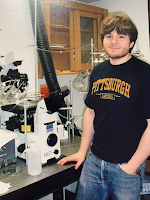Rob has a BS (Molecular Biology, 2003) from the University of Pittsburgh and PhD (Cell and Molecular Biology, 2008) from Penn. Rob is currently an Assistant Professor in the Department of Otorhinolaryngology at the University of Pennsylvania School of Medicine, with a secondary appointment in Physiology.
As an undergraduate at Pitt, Rob worked for ~3 years in Jeff Brodsky's lab studying ER quality control and proteasomal ER-associated degradation (ERAD) in yeast. Rob's graduate work in Kevin Foskett's lab at the University of Pennsylvania focused on lung physiology and cystic fibrosis (CF). He studied how mouse, pig, and human submucosal exocrine gland cells secrete the fluid that lines and hydrates the surface of the airway. They identified key molecular components of this process as well ways to potentially enhance fluid secretion in CF lungs. Rob also learned about calcium signaling, microscopy, and even did a little electrophysiology (two electrode voltage clamp and patch clamp).
Rob received an NSF graduate research fellowship and a Cystic Fibrosis Foundation predoctoral fellowship. He stuck around the Foskett lab for two more years as a postdoc to complete this work, supported by an Ann Weinberg memorial postdoctoral research fellowship from the CFF. This work also sparked a long interest in epithelial cell physiology, especially ion transport and calcium signaling in the airway. Rob did further postdoctoral work in Noam Cohen's lab at the University of Pennsylvania, focused on the cells of the upper airway (nose and sinuses). The Cohen lab mainly focused on the regulation of respiratory cilia function, which attracted Rob because it was another parameter of airway epithelial cell function regulated by calcium and which could be measured in real time by microscopy.
Rob lives in a suburb of Philadelphia with a wonderful wife and two energetic sons. Some of Rob's other favorite things include microscope filters, bourbon, Stax/Volt Memphis soul, salt & water transport, Kohler illumination, Bob Dylan, Tom Petty, and Led Zeppelin. Some of Rob's least favorite things include sanding drywall, weeding, beets, and accidentally tasting the denatonium benzoate.
- Rob at Penn School of Medicine
- Rob at Penn Physiology
- Rob at Penn Cell and Molecular Biology Graduate Group
- Rob on Google Scholar
- Rob on ResearchGate
- Rob's ORCID 0000-0001-5826-6686
- Rob's Researcher ID L-4397-2017
- Rob on LinkedIn
Teaching:
Abbreviated Teaching Philosophy: I have been very involved with teaching and mentoring throughout my scientific career, and I recognize the crucial importance of teaching in both formal classroom and informal laboratory settings. I try to place the same strong emphasis on rigorous training regardless of whether my students want to go on to be professional scientists or not. The most important and broadly applicable skill that students can learn from studying science and research is the ability to think critically and logically. Not only is this skill paramount to the training of future generations of professional scientists, it is also direly needed in all aspects of society, particularly in light of the requirement to filter through the increasingly enormous amount of information that is constantly available to us at our fingertips. Our world and society need more scientifically literate, rational people who can separate the signal from the noise, and thus I take all levels of teaching and training very seriously. I try to be approachable and supportive while keeping my communication as clear as possible. I also try very hard to adapt to the needs of my students and/or my own limitations, which I am constantly trying to honestly assess.
Some formal teaching activities Rob is involved with at Penn include:
- Graduate group membership: Penn Biomedical Graduate Studies (BGS) Cell and Molecular Biology (CAMB) and Pharmacology (PGG)
- Co-director, CAMB6920 "Advanced Topics in Cell Biology, Physiology, and Metabolism II: Cell Signaling and Metabolism"
- Director (fall section), CAMB6980 "Advanced Tutorials in Cell and Molecular Biology"
- Lectures: "Intro to signal transaction" (CAMB6920), "Respiration's First Defense: Anatomy and Physiology of the Nose" (MS2 med student pulmonary block), one lecture on "Sensory Physiology" and two lectures on "Membrane Biophysics" (CAMB5320, Human Physiology)
- Preliminary Exam advising, Cell Biology, Physiology and Metabolism program
- Curriculum committee, CAMB graduate group
- Vice Chair, Admissions Committee, UPenn PGG graduate group
Publications:
- Full publications listed on Rob's NCBI bibliography page
Patents:
- Diagnosis and treatment for respiratory tract diseases (Inventors: R.J. Lee, D.R. Reed, N.A. Cohen). USA Patent Number U.S. Patent No. 10,881,698, 2021
- Quinine and its use to generate innate immune response (Inventors: N. Cohen, R. Lee, S. Weiss, J. Maslow, C. Roberts, S. Cherry, M. Kohanski, N. Adappa, J. Palmer, L.H. Tan). US Patent Application PCT/US2021/028463, 2022



